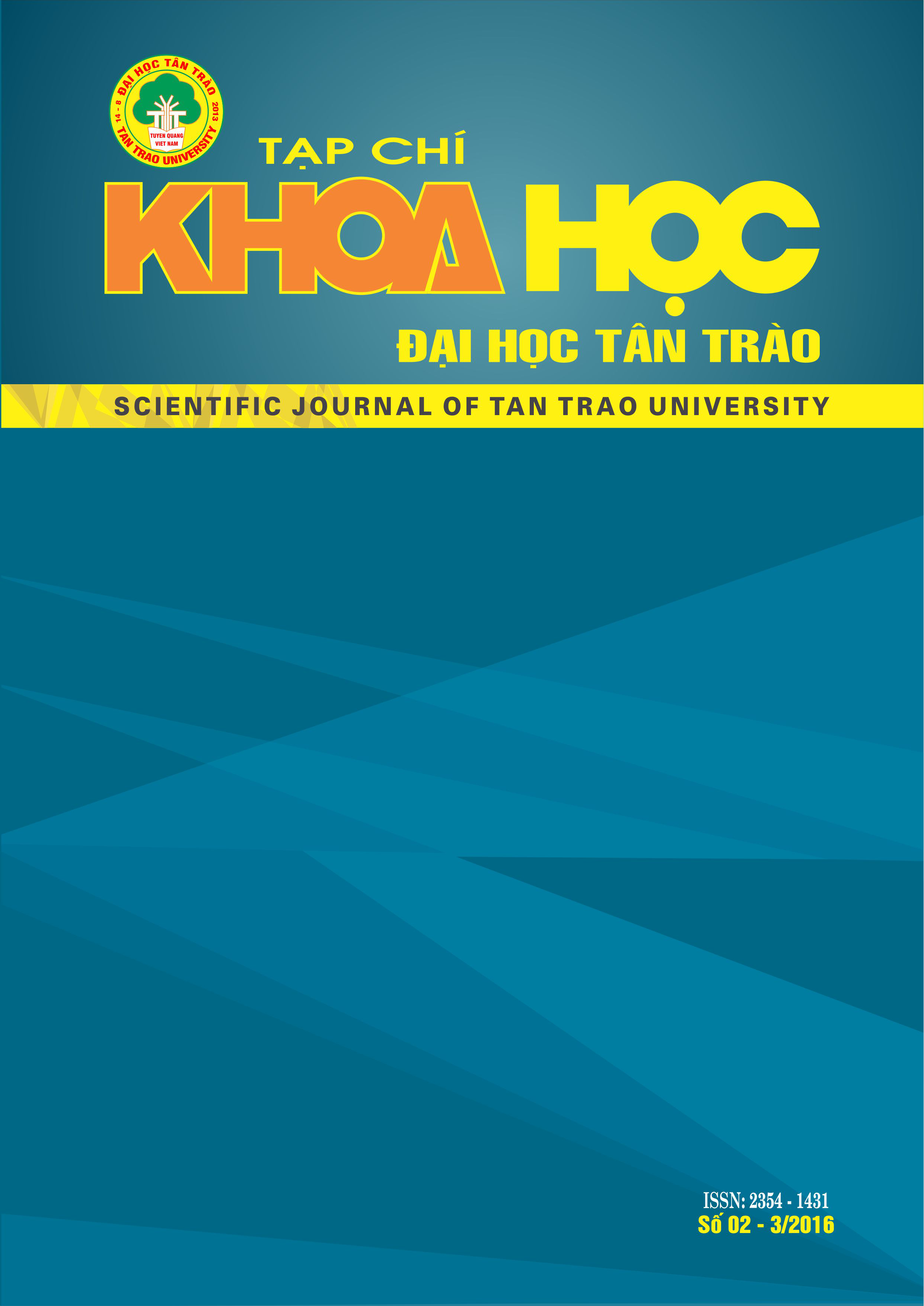Theories of developing learning communicative environment for pedagogy students at universities
DOI:
https://doi.org/10.51453/2354-1431/2016/63Keywords:
communication, development communication environment, communication learningAbstract
Students’ learning communicative environment affects directly the content of communication, forms of communication, effectivenes of communication and the maturity of students’ personality.
Therefore, it contributes to improve the quality of training at universities and meets the requirements of high-quality human resources for the country in the period of renovation. The aricle mentions and analyzes some theoretical issues of developing learning communicative environment
such as some studies on developing learning communicative environment, concept, purpose, characteristics as well as the ways and methods to develop learning communicative environment for pedagogy students.
Downloads
References
1. Nguyễn Thị Thanh Bình (1996), Nghiên cứu một số trở ngại tâm lý trong giao tiếp của sinh viên đối với học sinh khi thực tập tốt nghiệp, Luận án tiến sĩ, trường Đại học Sư phạm Hà Nội.
2. Vũ Hoàng Hiếu, Nguyễn Thị Huệ, Đinh Mỹ Linh, Vũ Thành Long, Nguyễn Thị Phương Châm (2012), Một số vấn đề về văn hóa mạng hiện nay (Internet: Mạng xã hội và sự thể hiện bản sắc), Đề tài khoa học cấp Bộ, Viện Khoa học xã hội Việt Nam.
3. Đặng Thành Hưng (2004), Hệ thống kĩ năng học tập hiện đại, Tạp chí Giáo dục, (278), tr. 25-27.
4. Trịnh Quốc Lập, Bùi Thị Mùi (2013), “Xây dựng môi trường học tập của SV trong lớp học theo học chế tín chỉ”, Kỷ yếu Hội thảo khoa học toàn quốc “Tâm lý học và vấn đề cải thiện môi trường giáo dục hiện nay” do Hội khoa học tâm lý- giáo dục Việt Nam tổ chức tại Cần Thơ, tr. 92-95.
5. Nguyễn Văn Lũy, Lê Quang Sơn (2014), Giáo trình Giao tiếp sư phạm, NXB Đại học Sư phạm, Hà Nội.
6. Ngô Giang Nam (2012), Nghiên cứu đặc điểm giao tiếp học sinh tiểu học nông thôn miền núi, Báo cáo tổng kết đề tài cấp Bộ, mã số B2010 - TN03 -15.
7. Nguyễn Bảo Hoàng Thanh, Lê Thanh Huy (2010), “Phương pháp soạn đề cương chi tiết môn học sử dụng trong dạy học ở các trường Đại học đào tạo theo học chế tín chỉ với sự hỗ trợ của E-learning”, Tạp chí Khoa học và Công nghệ, Đại học Đà Nẵng, Số 5(40), tr. 275-283
8. Trần Đình Thích (2010), Văn hóa giao tiếp trong nhà trường, NXB Đại học Sư phạm, Thành phố Hồ Chí Minh.
9. Angela Cora Garcia, Alecea I. Standlee Jennifer Bechkoff and Yan Cui (2009), Ethnographic Approaches to the Internet and Computer, Mediated Communication.
10. Denise Carter (2005), Living in Virtual communities: an ethnography of human relationships in cyberspace, National University of Singapore.
11. Brian Wilson (2006), Ethnography, the Internet, and Youth Culture: Strategies for Examining Social Resistance and "Online-Offline" Relationships ,Cyberculture and New Media , Francisco J. Ricardo edited 2009. Tiếng Nga
12. Сферы общения как лингвометодическая категория (1997), Исчисление сфер общения//Лингвистические и лингвометодические основы обучения русскому языку как иностраному (к 30-летию ФПК), Сб. статей. Москва, Изд-во РУДН. 1997.- с. 94-105.
Downloads
Published
How to Cite
Issue
Section
License

This work is licensed under a Creative Commons Attribution-ShareAlike 4.0 International License.
All articles published in SJTTU are licensed under a Creative Commons Attribution-ShareAlike 4.0 International (CC BY-SA) license. This means anyone is free to copy, transform, or redistribute articles for any lawful purpose in any medium, provided they give appropriate attribution to the original author(s) and SJTTU, link to the license, indicate if changes were made, and redistribute any derivative work under the same license.
Copyright on articles is retained by the respective author(s), without restrictions. A non-exclusive license is granted to SJTTU to publish the article and identify itself as its original publisher, along with the commercial right to include the article in a hardcopy issue for sale to libraries and individuals.
Although the conditions of the CC BY-SA license don't apply to authors (as the copyright holder of your article, you have no restrictions on your rights), by submitting to SJTTU, authors recognize the rights of readers, and must grant any third party the right to use their article to the extent provided by the license.


